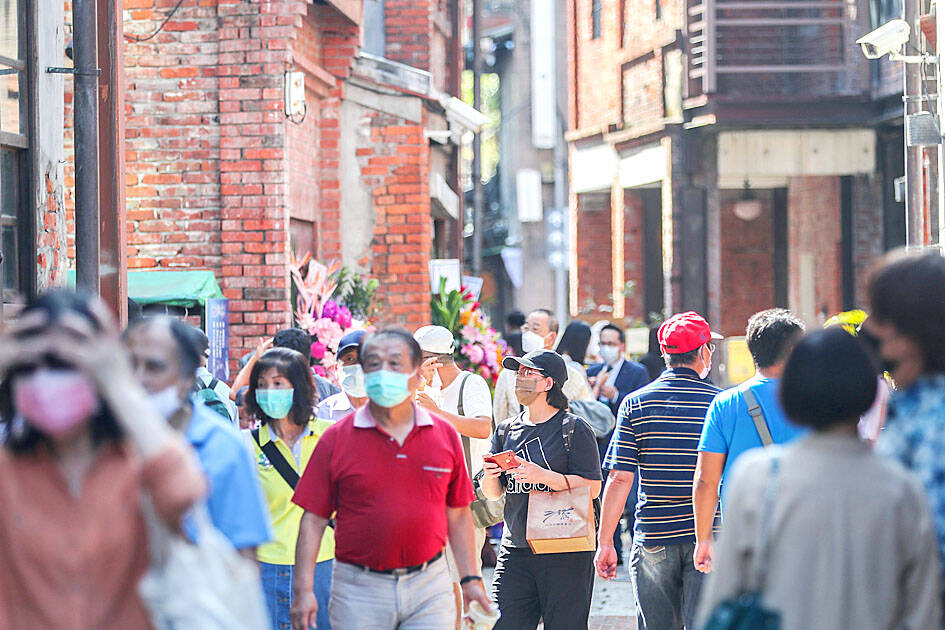The domestic mask mandate for COVID-19 prevention would not be lifted in the next few weeks, but it might be eased in November at the earliest, the Central Epidemic Command Center (CECC) said yesterday, as it reported 46,608 new local cases.
The Chinese-language Mirror Media yesterday published an interview with Deputy Minister of Health and Welfare Victor Wang (王必勝), who heads the CECC, in which it reported that the mask mandate might be eased in November if daily local caseloads are consistently low.
At a CECC news conference, Centers for Disease Control (CDC) Deputy Director-General Philip Lo (羅一鈞), deputy head of the CECC’s medical response division, said that as the local outbreak of the Omicron BA.5 subvariant of SARS-CoV-2 is still at a peak, the mask regulations would not be revised much in the next few weeks to help prevent overwhelming Taiwan’s healthcare capacity.

Photo: CNA
The CECC regularly reviews COVID-19 restrictions, referencing the policies in other countries and discussing how restrictions can be gradually lifted, including easing mask rules in outdoor and indoor settings.
As to whether the mandate might be eased in November, Lo said it is not certain at this point.
However, the CECC would pay close attention to the local COVID-19 situation after quarantine requirements for people arriving in Taiwan are scrapped from next month.
CDC Deputy Director-General Chuang Jen-hsiang (莊人祥), the CECC’s spokesman, said that 45,608 new local cases, 242 imported cases and 28 deaths were confirmed yesterday.
The daily caseload in the nation increased by 2.5 percent from Tuesday last week, he said, adding that BA.5 cases are still at a plateau.
New Taipei City reported the highest number of cases, with 9,019, followed by Taichung (with 6,154), Taipei (5,125), Taoyuan (4,220), Kaohsiung (4,186), Tainan (3,033), Changhua County (2,418), and fewer than 1,300 cases in the 15 other administrative regions.
Meanwhile, Lo said that after the CECC last week announced plans to lift border control measures, some frontline healthcare workers have asked if they would be allowed to travel abroad.
The temporary ban on overseas travel for healthcare workers was lifted on July 1, 2020, and the rule has not been in place since then, he said.
Healthcare workers have not traveled abroad much because of high demand at health facilities during the pandemic and because of the quarantine requirements on their return, he added.
After the “0+7” rule — no days of quarantine and seven days of “self-disease prevention” — is implemented, possibly on Oct. 13, healthcare workers would be allowed to go to work if they test negative seven days after returning to Taiwan, he said.

The CIA has a message for Chinese government officials worried about their place in Chinese President Xi Jinping’s (習近平) government: Come work with us. The agency released two Mandarin-language videos on social media on Thursday inviting disgruntled officials to contact the CIA. The recruitment videos posted on YouTube and X racked up more than 5 million views combined in their first day. The outreach comes as CIA Director John Ratcliffe has vowed to boost the agency’s use of intelligence from human sources and its focus on China, which has recently targeted US officials with its own espionage operations. The videos are “aimed at

STEADFAST FRIEND: The bills encourage increased Taiwan-US engagement and address China’s distortion of UN Resolution 2758 to isolate Taiwan internationally The Presidential Office yesterday thanked the US House of Representatives for unanimously passing two Taiwan-related bills highlighting its solid support for Taiwan’s democracy and global participation, and for deepening bilateral relations. One of the bills, the Taiwan Assurance Implementation Act, requires the US Department of State to periodically review its guidelines for engagement with Taiwan, and report to the US Congress on the guidelines and plans to lift self-imposed limitations on US-Taiwan engagement. The other bill is the Taiwan International Solidarity Act, which clarifies that UN Resolution 2758 does not address the issue of the representation of Taiwan or its people in

US Indo-Pacific Commander Admiral Samuel Paparo on Friday expressed concern over the rate at which China is diversifying its military exercises, the Financial Times (FT) reported on Saturday. “The rates of change on the depth and breadth of their exercises is the one non-linear effect that I’ve seen in the last year that wakes me up at night or keeps me up at night,” Paparo was quoted by FT as saying while attending the annual Sedona Forum at the McCain Institute in Arizona. Paparo also expressed concern over the speed with which China was expanding its military. While the US

SHIFT: Taiwan’s better-than-expected first-quarter GDP and signs of weakness in the US have driven global capital back to emerging markets, the central bank head said The central bank yesterday blamed market speculation for the steep rise in the local currency, and urged exporters and financial institutions to stay calm and stop panic sell-offs to avoid hurting their own profitability. The nation’s top monetary policymaker said that it would step in, if necessary, to maintain order and stability in the foreign exchange market. The remarks came as the NT dollar yesterday closed up NT$0.919 to NT$30.145 against the US dollar in Taipei trading, after rising as high as NT$29.59 in intraday trading. The local currency has surged 5.85 percent against the greenback over the past two sessions, central